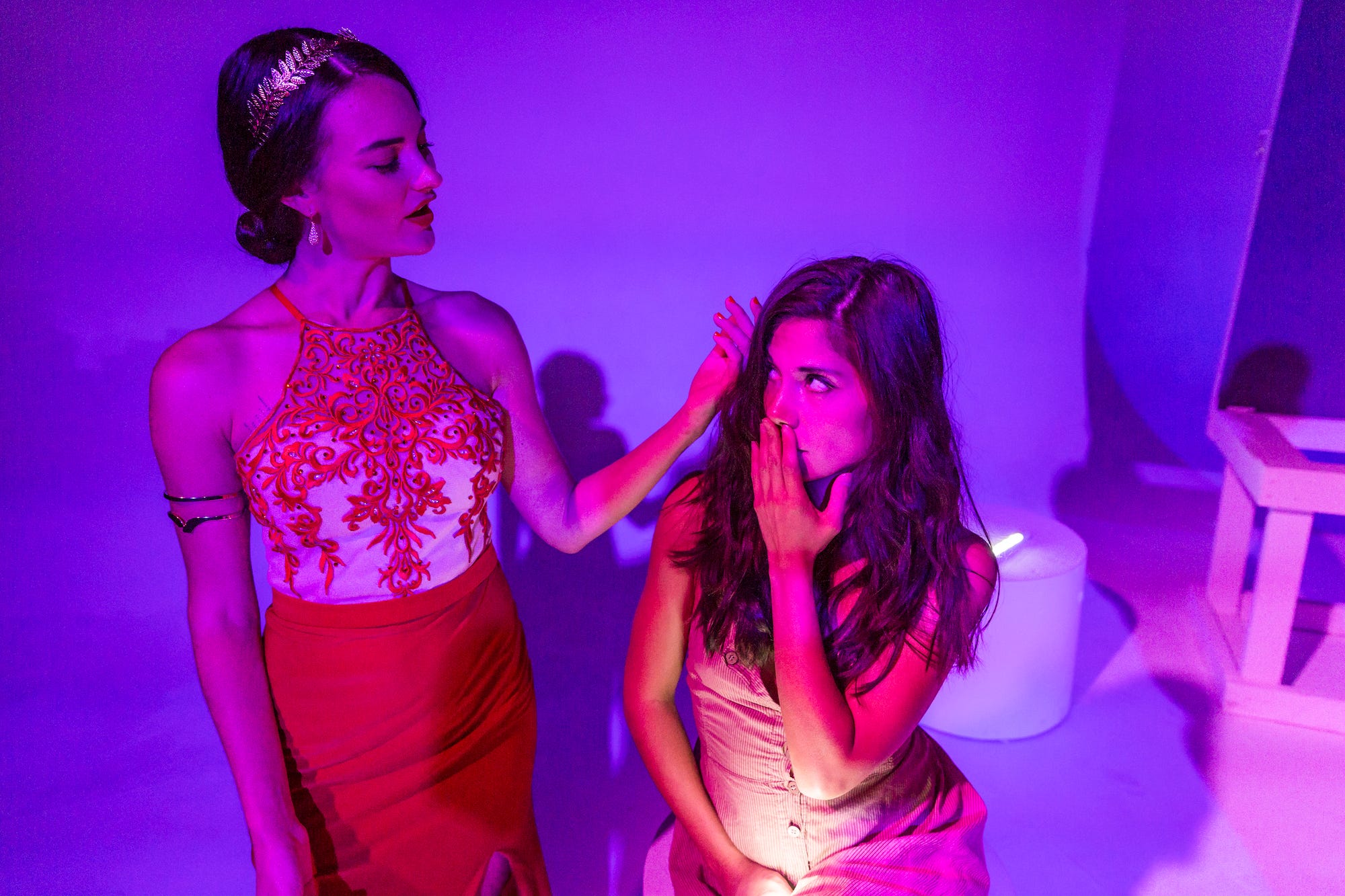
At the stroke of 10AM on a Saturday morning, there was a light rap on my front door. I was still in my bedclothes: sweatpants and black T with a crown of unruly curls, when I opened the door. What I discovered on the other side was a smartly dressed young women wearing sunglasses.
“Hello, Noah.”
“When you said 10, you really meant 10.”
She handed me a black envelope, the kind that comes with a greeting card.
“We look forward to seeing you tonight.”
The envelope was heavy. Far heavier than I expected. We exchanged a few more pleasantries and then she stepped down off my porch and back onto the Thai Town streets.
I stalked over to the dining table and jammed my pinky into the seam of the envelope, carving it open greedily. Inside was a rectangle of heavy card stock emblazoned with the words:
WELCOME TO YOU
In the center of that, a credit card made of black metal.

I peeled the card off the invitation. My journey into theatrical decadence had begun.
Let’s get a couple of things out of the way.
First: no, I did not pay. I don’t have $5000, the likely final ticket price of You, laying around. I was comped, because writing about this kind of thing is my career. A career that itself requires a day job and crowdfunding to maintain.
Second: yes, we will talk about the price tag. But not right off the bat. We’re going to talk about the work first. Because there is enough between the artistic value and the economic value of this to sustain a long discussion.
In so many ways, I am not the intended audience for this. In other ways: I’m exactly who this is meant for. The difference boils down to one word: capitalism.
I had told them I wanted my experience to begin at 8:15PM, and at precisely 8:15PM there was a light rap on my door. A young man with a British accent named David greeted me. The car was ready.
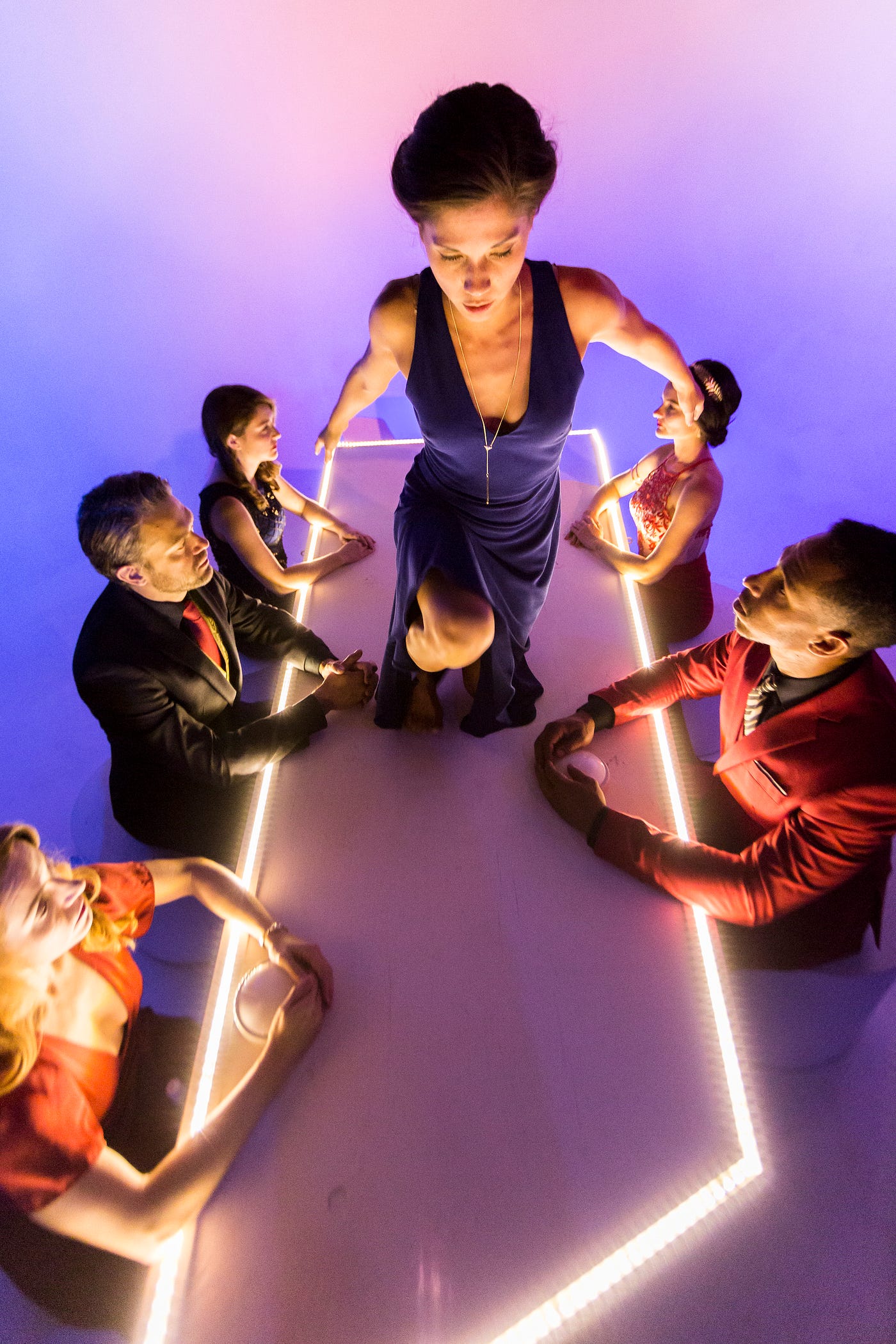
He led me to a black SUV where my drink of choice — an old fashioned — was waiting. Partition up and windows tinted. A Pandora station rocking out in an attempt to get me revved up as we rolled through traffic to our undisclosed destination. The Pandora station was a swing and a miss, it put me a bit on edge by playing all the bands adjacent to the ones I love. However, two out of three ain’t bad.
After traffic snagged us a little longer than the predicted twenty minutes, we arrived at our destination east of the river. The engine idled, the door opened, and a woman in red stepped into the back with me.
She introduced herself as Virgil, and she was to be my guide that evening. There were, of course, a few guidelines that needed to be gone over — and a boundary to be negotiated. Specifically around touch. I was asked which of four levels — from none whatsoever to romantic — I was comfortable with.
“I have a theatre degree,” I said, “and I’ve seen some shit. So that would be a four.”
We then went over the one rule: they could initiate touch, but I could not.
With the rules in place we stepped out of the car and into the world of me… um, You.
Six actors sat frozen at the bar, mid… well, everything really. Three women and three men. All dolled up. I instantly felt underdressed. Virgil told me they were all here for me, that this was a gift for me. I scanned the group, each holding as still as a freeze frame. The thought crossed my mind that this must be what it feels like to arrive on Westworld — beautiful people arrayed on display, ready to cater to your every whim.
The mad bastards went and did it, I thought. They really went and did it.
(I mean, not really. See the rules above. But for that brief moment the feeling was there.)

Virgil clapped her hands and they came to life, greeting me and going about their little loops at the bar. This is the central social space of You, where the cast and patron — solitary, decadently spoiled patron — retire between performances. Here the drinks and food flow freely. They’d asked what I wanted to have on hand to eat beforehand and I demurred, knowing that they probably would have hunted down an everlasting gobstopper if I’d asked. Or at least two pints of Jeni’s and the bread pudding from The Alcove. I wasn’t here for the food, I was here for the plates.
Get Noah J Nelson’s stories in your inbox
Join Medium for free to get updates from this writer.
SubscribeSubscribe
That’s what they call each of the eleven performances that are available to guests: plates.
One-act plays that run the gamut from the epic to the satirical, all snapped together by the cast in one of the four black-box style performance spaces (plus the bar) that are delineated by clean cut, abstract set pieces and sharp lighting effects.
You, as a theatrical production, isn’t what we tend to think of when we think of immersive. Not, at least, on the high end of the ticketed spectrum. The emphasis isn’t on the built world of the set, but on the protean abilities of its performers to flit between comedy and drama at the flick of a proverbial switch.
Faced with the menu at the bar I wasn’t sure which plate to tackle. Each had a title and a short teaser description, but I relied on my Virgil to guide me through the emotional tones of the choices. Theatre as fine dining. Virgil as emotional sommelier. I told her I was looking for light fare, as the days have been heavy and I needed to lift my spirits. She helped guide me to a piece called Turing that cast two of the performers — and myself — as high end androids.
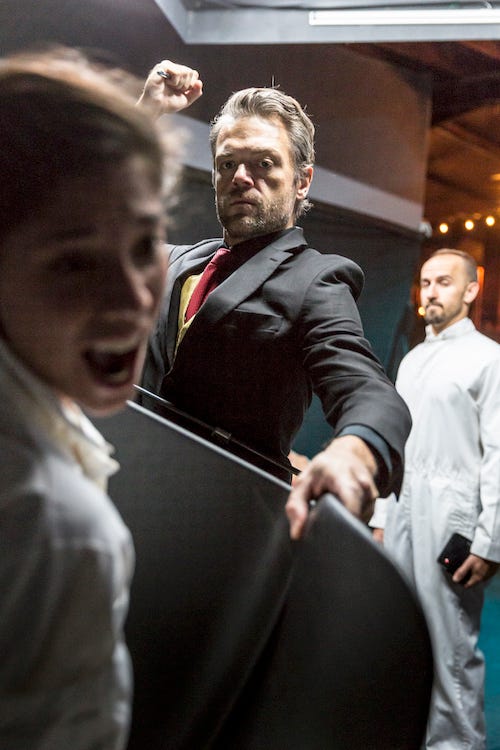
Turing was the most interactive, and about the most broadly comic, piece of the night. A fairly good easing in for someone who spends a lot of time inside interactive theatre spaces. Not so demanding, however, that an uninitiated theatre patron would feel put upon. I got to do my favorite thing — play with the actors — and then, the ice broken, we retired back to the bar.
This became the rhythm of the night for the next three or so hours. Show, then the bar. The bar, then the show. The idealized version of a life in the theatre, compressed down into a black box that was separated from the rest of reality. Some pieces had robust interaction, some didn’t. Some felt broad and theatrical, others intimate and cinematic. I keep trying to put into pithy terms just what the whole experience is: a “theatrical spa” keeps coming up.
None of that dynamic would be possible if the text of the plays and the direction were dreck. Thankfully writer-producer Edward Tucker and director Daniel Student are quite good at what they do. I realized, about halfway through the night, that if I had been in college with the two of them I would have always been eager to see what they came up with next. In fact I would have probably eagerly volunteered to be in whatever weird experiment they concocted.
It probably doesn’t hurt that Tucker’s writing is simpatico with my tastes. There’s touches of sci-fi, and in the hour long talk we had a week or so before I visited the production we spoke of Tom Stoppard and Tony Kushner, which set my mind in a particular frame. A gamble, perhaps, on Tucker’s part — those are some heavy names to lay out to a theatre kid — but one that paid off.
If anything it made me a bit melancholy about half way through the show to think that so few people would see these plays. Well, the old fashioneds probably helped some too.
Student’s direction shows as much range as the space allows, backed up by the deep skill set of the cast. An encounter with the Gods which was heavy on language remained deliciously visceral. A seriocomic board meeting which could have drowned in jargon stayed crystal clear in spite of a second-night audio glitch.
While there’s no narrative thread to night’s work, the thematics are strong in this anthology. There is the up front theme of you — the patron — being the center of attention and moral action, for starters. Then there is a subversive streak in the writing in some of the pieces which I think could play very differently for an investment banker from how it plays for someone who makes under six figures a year.
You is the creation of a new company, Hall and Mirrors, put together by Tucker and inspired by his experience of paying through the nose for Hamilton tickets on StubHub only to wind up next to unruly patrons. It got him thinking: what would a theatre experience that was worth four figures look like?
That question led to You, which the company states costs upwards of $4300 a performance to put on. Between rent, private transportation, technicians, and performers who are at your beck and call for three or more hours it’s a math that — shockingly — plays out. Theatre is expensive to produce on any scale, and to put this many human resources into play all in the service of one patron. Well, after the initial shock of hearing “the tickets cost $5000,” the price makes sense.
It does beg the question, however: is You worth $5000?
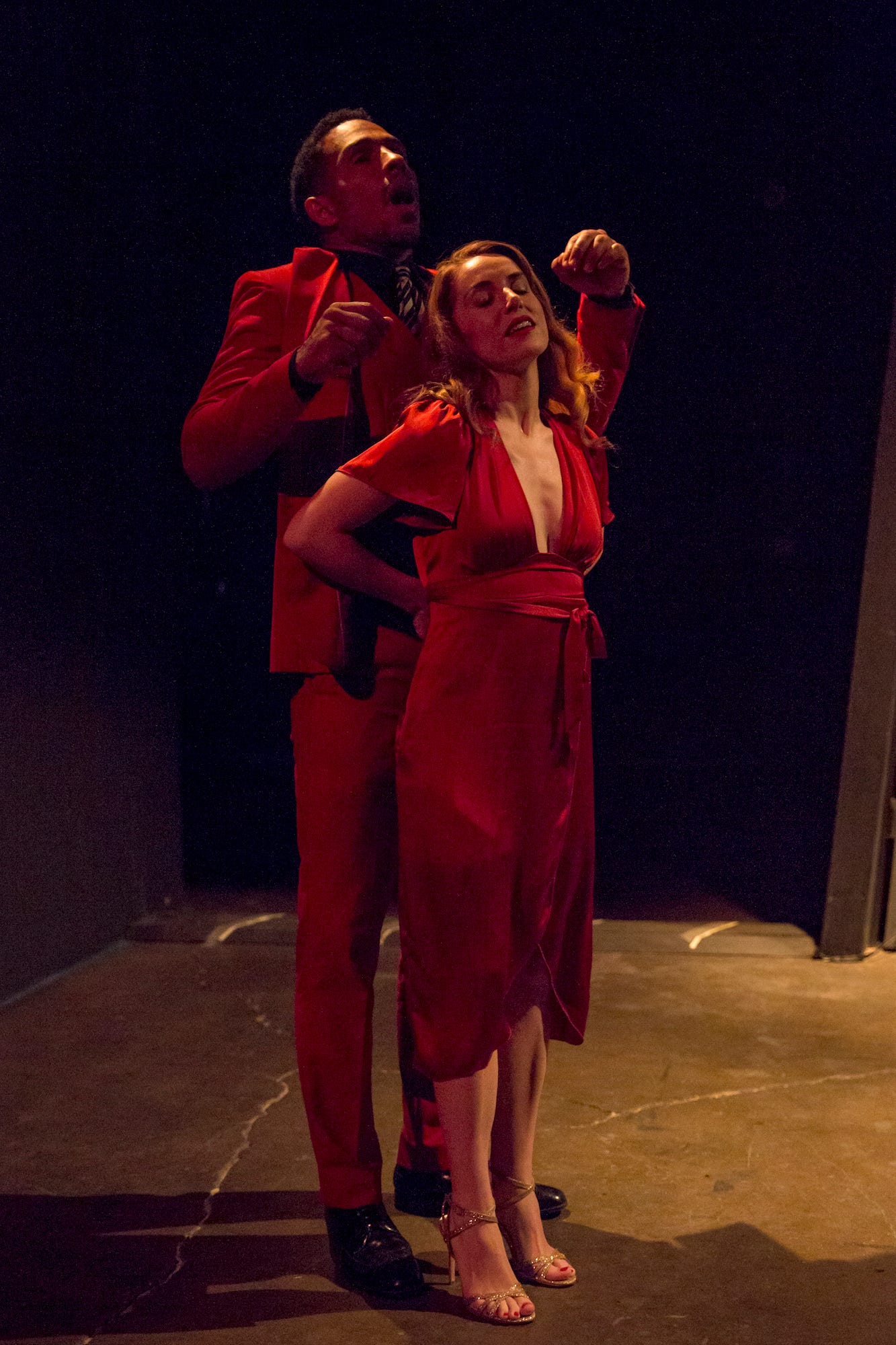
This is what I’ve struggled with in the week-plus since I’ve seen the show. Clearly, I am not the target demographic. If I had $5000 it would be snapped up by the good folks at Visa to cover the creeping debt that they’ve enabled me to rack up. At my end of the socio-economic spectrum (roommate-having apartment dweller in a medium-high density neighborhood, driving a car with nearly 200,000 miles on it) $5000 is an insane amount of money.
Yet I know that a week at the Star Wars resort in Orlando, once it is built, is probably going to cost that much. Which is why I need to start socking away cash now. Which also means that I can understand how someone can value You at $5000.
I mean, for the love of God: I had seven actors at my disposal for the better part of four hours. They had to perform for me, make conversation when they weren’t performing and worst of all listen to my stories as I got tipsy. I even rebelled against the menu structure at one point and invented a game by which they could surprise me with the next plate without veering off into anything I really didn’t feel like seeing.
All to an intermission soundtrack pulled from my favorites, managed by some unseen hand who was either shockingly good at picking out music to match the mood or divinely lucky. (Thus redeeming the sad Pandora experience in the car.)
If I win the lotto tomorrow will I book another visit to the world of You? Mayhaps. Hall and Mirrors has a vision of the work evolving into a truly bespoke affair, with patrons able to request specific themes and stories. That would, of course, cost more.
Look: the artistic democrat in me wants good work to be enjoyed by as many people as possible, and chafes at the idea of people being priced out of good work. Yet if something is to have a hefty price tag I’m content to have that be going straight into the pockets of the people making the work. Far better that then having StubHub or scalpers skim off the top.
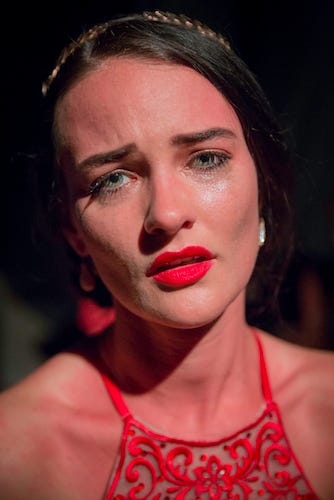
Artists should be making a living wage — or better — for doing the work and doing it well. Which is what the cast and crew of You is doing.
The problem of price — whether it is You or Punchdrunk’s Kabeiroi — is a symptom of late capitalism. I’m angry with with the whole damn system, not the artistic rogues who are trying to find a hustle through it. I would hope, however, that Hall and Mirrors can find a path in the long run to bring some version of these works to more people. Perhaps over the arc of a long enough run some of the plays could be released into the wild in some form or another as they spin up new plates to replace old ones. A little Robin Hood action, if you will.
What will surely always remain at the top tier is the irreplaceable experience of having a bar full of very fine actors doting on you for hours on end. Talking, laughing, playing. Confessing your darkest fears and tragedies and having them validated by shared experiences. (Honestly: I told my Virgil things I don’t tell my friends and wouldn’t tell someone at a “probing” immersive show. Why? Because she’d earned my trust.) It used to be that there was only two ways I knew how to get that experience — theatre school or producing a show — both of which come with price tags that can run far higher than four figures.
And now, there’s You.
You is a production of Hall and Mirrors. Tickets — you caught the part where they run $5000, yes — are available for the open ended run.
No Proscenium is a labor of love made possible by our generous Patreon backers: join them today!
In addition to the No Proscenium web site, our podcast, and our newsletters, you can find NoPro on Twitter, Facebook, YouTube, and Instagram and in our online community Everything Immersive.


















Discussion